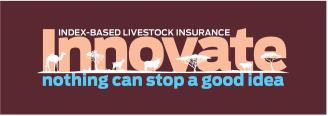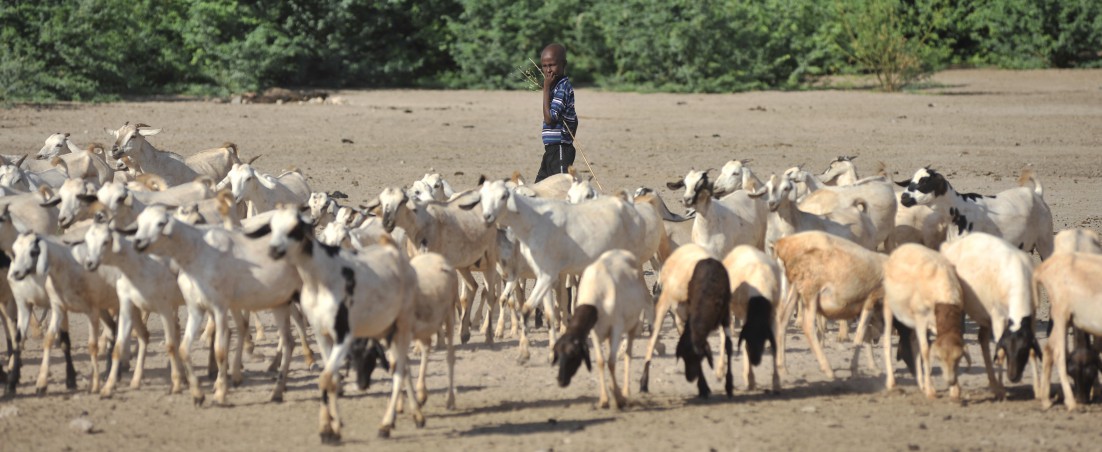The problem
Drought is the most widespread and serious threat faced by households in the Arid and Semi Arid Lands of northern Kenya and southern Ethiopia. Severe droughts, which can cause catastrophic herd losses, are increasingly frequent and more intense, and could be attributed to climate change. For households who rely on livestock, such herd losses have devastating effects on livelihood. Standard responses, such as food aid and post-drought restocking, are often slow, insufficient and expensive. As a result, these households are among the most vulnerable in Kenya and Ethiopia.
ILRI, together with its partners, has been working to implement a sustainable solution aimed at helping pastoralists minimize the impact of drought-related herd losses and accelerate recovery. This solution, index-based livestock insurance (IBLI) compensates insured pastoralists based on forage scarcity caused by prolonged drought over a season (as indicated by satellite imagery). IBLI is much more suited to the pastoral production system than conventional insurance because pay-outs are based on external readings and do not require very costly individual verification of losses. These IBLI pay-outs provide much needed cash for emergency needs occasioned by the drought and may also be used for keeping the livestock alive and/or restocking.
What has been done so far?
Uptake of IBLI depends on whether pastoralist communities understand the concept of insurance, the products on offer and the processes involved in purchases and claims. Carefully designed extension and education programmes on insurance are therefore a critical part of expanding access to micro-insurance as a risk management option for the poor. The IBLI project team has tried a variety of approaches to create awareness on the insurance contract including;
- Extension materials e.g. comic books, FAQ’s, videos (edutainment videos).
- Working with NGO partners to embed IBLI education into their regular programming
- Insurance games and simulations
- Radio advertising and call -in shows
The challenge
Despite all efforts, pastoralists still struggle to comprehend the product and make informed purchase decisions. Consequently, adoption levels of IBLI among the target population have been relatively low. We therefore face the challenge of designing awareness and extension programs that will reach pastoralists in an effective manner.
For more information on the research and development of IBLI, the strategies that have been used to reach pastoralists and other frequently asked questions please visit the innovation challenge website: https://ibliinnovationschallenge.wordpress.com/
How you can help!
By developing and submitting an innovative ‘extension and awareness’ campaign idea, you will be contributing to a research and development effort, and could help spread the knowledge amongst pastoralists about IBLI and how it can help them. This innovation challenge will reward individuals and/or organisations who propose innovative campaign ideas that show the most promise of reaching more pastoralists with clearer messages about the IBLI product. Successful submissions must demonstrate an understanding of the communities and terrain in Northern Kenya.
The top three entries will earn cash rewards for their originators, in addition, these winning entries stand a chance of being implemented.
| Best idea | 2nd best idea | 3rd best idea |
| KSH 250,000 | KSH 200,000 | KSH 150,000 |
If your idea is among the ones selected to go into the second round where more comprehensive proposals will be requested, you will receive a certificate, a branded IBLI T-shirt and a cap
To participate, submit a short concept note in the prescribed format available from the IBLI challenge website describing your innovative awareness and extension approach including the type of messages and communication channels that can more effectively reach pastoralists with information on IBLI.
Assessment criteria
Submissions will be assessed on the following criteria:
- Content strength: Submission will need to articulate what the messages about IBLI to pastoralists should be, how they should be delivered and by who.
- Relevance: The campaign should be relevant to both the issue and the community. We are looking for ideas that tackle the challenge of communicating IBLI effectively to pastoral groups. The idea should recognize the difficulty in executing such campaigns given the context and infrastructure difficulties of Northern Kenya.
- Originality: There will be points for original and innovative ideas. The IBLI project has already tried out several approaches to extension and awareness creation. What is new and fresh about the approach that you are proposing?
- Practicality: the idea should be realistic and doable
- The idea should be replicable and scalable. This is the extent to which the idea can be repeated by other groups and used in other geographical areas and at different times.
The innovation challenge process
Step 1: Short concept notes expressing the extension and awareness idea will be received by IBLI. Up to 40 of these will be selected for the next stage.
Step 2: The applicants whose ideas are selected at stage 1 will be invited to write full proposals, describing in more detail the plan as they see it. From these, only 10 proposals will be selected
Step 3: The 10 top proposals will be invited to an intensive proposal development workshop and will be supported to further refine their ideas. From these, the top 3 will be selected to win prizes.
Email ibliwebsystem@cgiar.org

